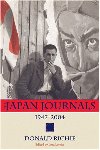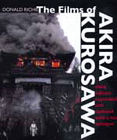![]()

![]()
(aka "Yari no gonza" or "Gonza the Spearman" )
directed
by Masahiro Shinoda
Japan 1986
Based upon the buranku play by Chikamatsu, “Yari no Gonza”
becomes a complex character study of a samurai, who is a master in the use of
the yari (the spear), which no longer is of value, as the nation is at peace.
In order to both advance as samurai and make a name of himself, Gonza has to
master an art form, the one of his choice is tea ceremony. At the same time
Gonza is a very beautiful man, so beautiful, that songs are written about him.
To celebrate the birth on an heir to the daimio, a demonstration of tea
ceremony is chosen. Two samurai are suggested: Ichinoshin and Gonza. But Gonza
has only been taught not to error, so in order to acquire the scroll which
will enable him perfection, he accepts the wish of Ichinoshin’s wife, Osei, to
marry their daughter, Okiku. But Gonza is already involved with another woman,
Oyuki, whom he also promised to marry, but still promises, in order to get the
scroll, that "If I should violate this oath, may I never again wear armour on
my back, may I be slashed to bits by Ichinoshin's sword, and may my dead body
be exposed on the public highway!" Eventually Gonza is exposed and killed by
Ichinoshin.
While most plays of Chikamatsu deal with the conflict between giri (duty) and
ninjo (passion), the characters here are far more complex. Gonza is not torn.
His passion lies with Oyuki and his duty is to his own advancement. Okiku is
not torn. Her duty is to Gonza, as well as her passion. If any is torn, then
its Osei, who, when discovering the adultery of Gonza, becomes furious. Not
because of his adultery, but because she was deceived by him. Gonza is not a
bad guy, but more a victim of a society, which has no use for his skills.
Shinoda previously used Chikamatsu as source with “Double Suicide” (1969), but
in “Yari no Gonza” he recreates Chikamatsu by using the story and characters
to advance his own vision towards cinema. Shinoda thus continues to recreate a
unique style, which on one side is highly stylised and on the other liberated
by its dynamic mise-en-scene vs. buranku. The result is one of the most
intelligent adaptations of a Chikamatsu text and a very unique period piece.
Posters
 |
|
Theatrical Release: February 20, 1986 (Berlin International Film Festival)
Reviews More Reviews DVD Reviews
DVD Review: ArtsMagic - Region 2 - PAL
Big thanks to Henrik Sylow for the Review!
| DVD Box Cover |
|
CLICK to order from: NOTE: Purchases through DVDBeaver's links to Amazon help keep us afloat and advertisement free! |
| Distribution |
ArtsMagic Region 2 - PAL |
|
| Runtime | 2:06:14 | |
| Video |
1.62
Original Aspect Ratio |
|
|
NOTE: The Vertical axis represents the bits transferred per second. The Horizontal is the time in minutes. |
||
| Bitrate |
|
|
| Audio | 2.0 Dolby Digital Japanese | |
| Subtitles | English (fixed) | |
| Features |
Release Information: Studio: ArtsMagic Aspect Ratio:
Edition Details: Chapters 13 |
|
| Comments |
Presented in original aspect
ratio of approx 1.6:1, the DVD falsely suggests a 16x9 anamorphic
presentation. However the menus are in 16x9. The image lacks detail and has a lot of contrast. Likewise the colours seems faded. Additional, there are ghosting and edge enhancement issues. Overall a very poor transfer. |
|
Recommended Reading for Japanese Film Fans (CLICK COVERS or TITLES for more information)
 |
 |
 |
 |
 |
 |
 |
 |
 |
|
The Japan Journals : 1947-2004, by Donald Richie |
The Midnight Eye Guide to New Japanese Film by Tom Mes and Jasper Sharp |
Kon Ichikawa (Cinematheque Ontario Monographs) by James Quandt, Cinematheque Ontario |
Shohei Imamura (Cinematheque
Ontario Monographs, No. 1) by James Quandt |
Eros Plus Massacre: An
Introduction to the Japanese New Wave Cinema
(Midland Book, Mb 469) by David Desser |
The Films of Akira Kurosawa by Donald Ritchie |
by Yasujiro Ozu, Kogo Noda, Donald Richie, Eric Klestadt |
Ozu by Donald Ritchie |
A Hundred Years of Japanese Film by Donald Richie |
Check out more in "The Library"
DVD Menus
|
|
|
|
|
|
Subtitle Sample
|
|
Screen Captures
|
|
|
|
|
|
|
|
|
|
|
|


















